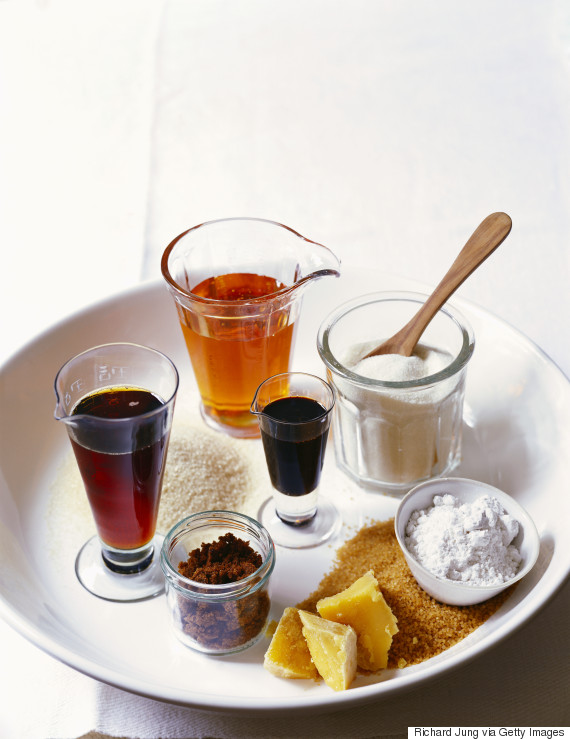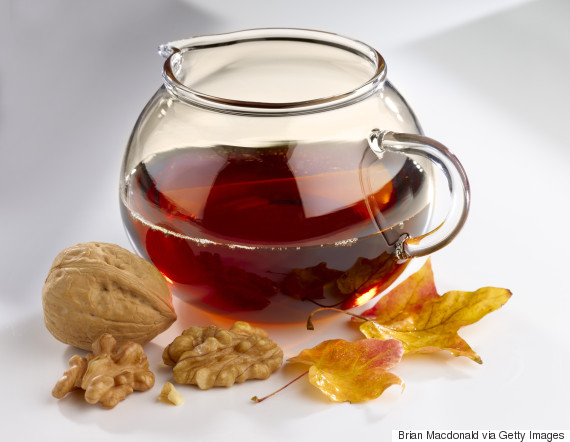The Lowdown On Popular Sugar Alternatives
Stevia, coconut sugar, date syrup, agave, xylitol. These popular sugar alternatives are everywhere, from best-selling cookbooks to Instagram. But are these hyped-up sugar alternatives all they've cracked up to be? "Just because it’s not table sugar, it’s still a source of sugar, it’s just a different type," accredited practising dietician Chloe McLeod told The Huffington Post Australia. "I think a lot of us use the alternatives and think, 'that must mean that it’s healthier so it’s okay'," McLeod said. When it comes to sugar alternatives, McLeod advises to use the alternatives you like, they can often provide different flavours for different uses, but regardless of what it is, use it in moderation. "Just being aware that [they] do still contribute to your overall sugar consumption for the day is very important," McLeod said. Qualified nutritionist Michele Chevalley Hedge agrees. “The poison is in the dose," Hedge told HuffPost Australia. “We know that the World Health Organisation recommends six teaspoons of non-natural sugar for optimal health,” Hedge said. "Even if we we’re eating an incredible abundance of fresh fruit all day long, that would be an excess of fructose, yes, it would be natural sugar, but it would be in excess.” So of all these popular sugar alternatives, which one is best? “The sugar alternatives I use in order of preference are stevia, rice malt syrup, dates/date syrup, maple syrup and a small amount of unprocessed honey,” Hedge said. McLeod, on the other hand, believes the 'best' alternative depends on the individual and what they're needing to use them for. "Say it’s a client wanting to manage their weight but likes to have something sweet occasionally -- I would honestly say use the one that you like the flavour of and what works best in your cooking, but use it in quite small amounts," McLeod told HuffPost Australia. "For someone who does have gut issues, I would be recommending something like maple syrup or coconut sugar because both of those do tend to be a bit safer for people with irritable bowel syndrome," McLeod said. "You've got to put it into context of who the person is and what’s the healthiest and the worst for that person." 
The Lowdown
1. Maple Syrup Made from boiling down the sap from maple trees and is typically 100 percent natural. “Maple syrup is at least 66 percent sucrose, which means about 30 percent fructose,” Hedge said. "One of the positives of maple syrup is that it is suitable for people with lots of different food intolerances because it’s low FODMAP and low in natural food chemicals," McLeod said. "Plus it’s also a really good source of zinc and manganese."
2. Rice Malt Produced from fermenting brown rice. “Rice malt is broken down into 100 percent glucose and so it has a very high GI -- however, it contains no fructose," Hedge said. "Even though this one is quite low in fructose, it is still a source of sugar," McLeod said. "Use it if that’s the flavour you prefer, but still use it in moderation."
3. Dates & Date Syrup Made by boiling down medjool dates (although sometimes left unstrained to retain the fibre and nutrients). “Dates are a good choice as they are high in fibre and, although high in sugar content, the absorption into the blood stream is slowed by the fibre,” Hedge said. “However, the total sugar content of dates is over 60 percent,” Hedge said. "Dates have a really lovely flavour and, in most of the syrups, it's just pure, natural date syrup without added sugar," McLeod said. "Still use it in moderation."
4. Stevia Made from an extremely sweet herbaceous plant, stevia is up to 150 times sweeter than regular sugar. Stevia can be found in either a green powder form, as a more highly refined white powder or as liquid drops. "Stevia contains no glucose or fructose, so it has a negligible effect on blood sugar," Hedge told HuffPost Australia. "It does sometimes have a slightly metallic aftertaste and can’t be used in some baked goods. "Stevia is much lower in kilojoules than lots of the other sugar alternatives, so it’s quite popular in that respect," McLeod said. "But at the same time, when you’re having something this sweet it can give you that taste for sweetness and you can then often look for more sweet things, more often. "In that instance, again, use it in moderation," McLeod said. 
5. Coconut Sugar Coconut sugar is derived from the sap of the coconut plant. "Whilst its manufacturing method is very natural, contains a small amount of fibre, a few nutrients and has a lower glycaemic index than regular sugar, it is actually very high in fructose," Hedge said. "It’s another good option and texture-wise it can work quite well in baking," McLeod said. "But the same thing applies -- don’t go overboard."
6. Agave Agave is a sugar substitute made from the same Mexican succulent that tequila is made from. "It contains roughly 90 per cent fructose -- higher than sucrose! So beware and look out for it in health food bars and chocolates," Hedge said. "If I was working with one of my clients with IBS and they were on a low FODMAP diet I would say steer clear because it is likely to cause an issue," McLeod said. "I would say treat it like you would treat any other alternative sweetener -- yes, it does come from a plant and gives a unique flavour, but it’s still sugar," McLeod said.
7. Honey Made by bees foraging nectar from flowers. "As for honey, there is no doubt the raw, natural type comes loaded with nutrients such as a prebiotic that feeds gut flora -- as well as small amounts of proteins, enzymes, amino acids, minerals, trace elements, vitamins, aroma compounds and polyphenols. "However that is not the full story -- honey contains about 40 percent fructose which is just a little less than sucrose (or table sugar)," Hedge said. "I’m a big fan of honey, "McLeod said. "I think it can be really versatile and Manuka honey in particular has some really great antibacterial benefits. "But again, honey is actually really high in fructose, so if you are a person who is sensitive to that, then it is a good idea to be careful," McLeod said.
8. Xylitol Xylitol is a sugar alcohol that used to be derived from birch trees but is now more likely to come from corn husks. "It has a low GI but, consumed in large amounts, xylitol can cause gastric problems -- it can have a laxative effect causing diarrhoea and bloating," Hedge said. "Xylitol is another one that is a lot lower in calories than other sugars," McLeod said. "For some people it can be an appropriate alternative because of the lower calorie option while still giving sweetness."
Categories
- A Healthy View (507)
- Breakfast Recipes (22)
- Chicken Dinner Recipes (29)
- Chilli Recipes (5)
- Christmas Recipes (14)
- Curry Recipes (8)
- Dessert Recipes (20)
- Dinner Recipes (113)
- Easter Recipes (9)
- Energy & Vitality (4)
- Free Recipes (232)
- Gut Health (11)
- Hormone Health (17)
- Media (86)
- Mental Health (30)
- Mexican Recipes (11)
- Nutrition (205)
- Productivity (5)
- Salad Recipes (9)
- Sauce & Dip Recipes (12)
- Seafood Recipes (12)
- Sleep (7)
- Soup Recipes (12)
- Snack Recipes (56)
- Stress (2)
- Sugar (14)
- Weight Loss (36)
- Workplace Wellbeing (26)
- Brain Health (3)
- energy (1)
- calories (1)
Ready to take the next step?
Explore our full range of wellbeing courses and start your journey today.

Michele Chevalley Hedge is a qualified Nutritional Medicine Practitioner, speaker, and best-selling author has delivered 600+ keynotes for leading global brands, including Microsoft, Accenture, American Express, Apple, ANZ, CBRE, the Australian Government, and more.
Michele’s nutrition retreats, wellness courses, books, articles, and corporate health programs are backed by peer-reviewed research on workplace well-being, nutrition, stress, and mental health. A regular guest on Channel 7, Sunrise, and The Today Show and contributor to The Sydney Morning Herald, Body & Soul, and The Daily Mail, Michele is also an Ambassador for Cure Cancer and the Heart Research Institute.



0 comments
Leave a comment
Please log in or register to post a comment